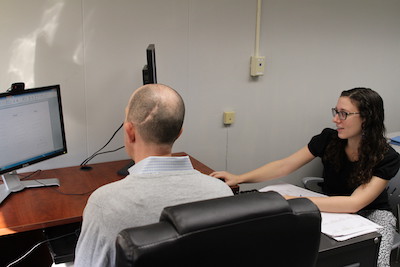Research Projects
This study, which is funded by CurePSP, is being conducted in collaboration with Dr. Michelle Troche, who directs the Laboratory for the Study of Upper Airway Dysfunction. In this study we are comprehensively evaluating language, cognition, speech, swallow, cough and airway protection function in people with Progressive Supranuclear Palsy (PSP). Additionally, we are evaluating whether people with PSP are potentially stimulable for treatments approaches that address speech, language, and swallowing impairments. Click here to learn more about PSP. https://www.psp.org/.
If you are interested in learning more about participation in our research, email us at aphasialab@tc.columbia.edu.
This study evaluates reading comprehension in various conditions on an eye tracker in order to understand more about how reading is potentially affected in the presence and absence of accompanying pictures and distractors. We are currently seeking native English-speaking participants between the ages of 18 and 80 for this study. It pays $20 for a 2-hour session.
If you are interested in learning more about participation in our research, email us at aphasialab@tc.columbia.edu.
Word retrieval is difficult for all persons with aphasia and can affect the ability for a person to convey his or her ideas, thoughts or emotion. Verb Network Strengthening Treatment (VNeST) is an aphasia treatment that aims to improve word retrieval in sentence and discourse production in persons with aphasia. Previous research has shown improvements to single words, sentences and/discourse in persons with aphasia who received VNeST in person (e.g., Edmonds & Babb, 2011; Edmonds Mammino, & Ojeda, 2014; Edmonds, Obermeyer, & Kernan, 2015; Edmonds, Nadeau, & Kiran, 2009), in (Korean Kwag, Sung, Kim, & Choen, 2014) and via teletherapy with integration of typing within treatment (Furnas & Edmonds, 2011). The current study provides VNeST to persons with aphasia and works on improving word production in speech and in typing on a computer. Participants also receive treatment in-person with a clinician or via the teletherapy with a clinician. This study aims to provide more information about the effect of VNeST on spoken and written sentences and discourse.
If you are interested in learning more about participation in our research, email us at aphasialab@tc.columbia.edu.

There is a lack of testing materials for people with bilingual aphasia (bilingual individuals with aphasia in both languages). In order to develop assessment materials, it is critical to have information about how bilinguals without aphasia use both languages. This study builds on previous research that reported normative data from Spanish-English bilingual individuals in naming (Edmonds & Donovan, 2012, 2013) and in discourse (Edmonds, 2013). The current study evaluates naming and other language tasks in Spanish-English bilinguals aged 40 and older in order to add to our understanding of naming and discourse production in a variety of bilingual individuals to provide important normative information upon which to compare persons with Spanish-English bilingual aphasia.
If you are interested in learning more about participation in our research, email us at aphasialab@tc.columbia.edu.